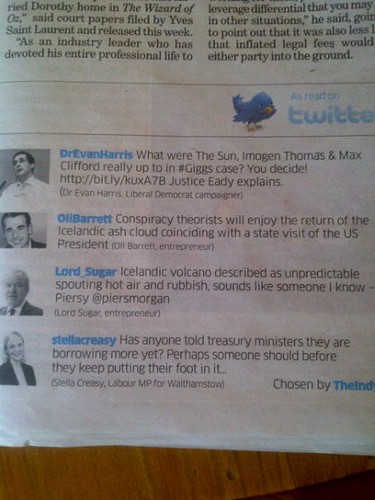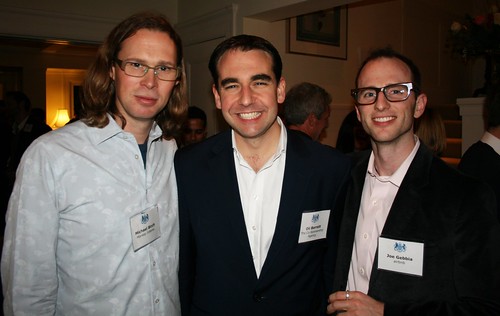Padlocks, Mojo and Carl Schramm
I was at NESTA last night to listen to Carl Schramm, president of the Kauffman Foundation.
If you don’t know it, The Kauffman Foundation (based in the US) describes itself as the leading private funder of economic research related to growth and innovation in the United States. It also plays a leading role in educational reform. Before his involvement in Kauffman, Carl founded several companies and has advised presidents and Prime Ministers, working around the world from Kansas to Kabul.
Like many interesting gatherings, it wound me up immensely.
It is not an exagerration to describe Carl Schramm as a world authority on entrepreneurship. We have met briefly, once, and I liked him enormously. I found him to be warm, funny and thoughtful.
He spoke last night about the importance of new companies to a nation’s economy. Did you know, for example, that 40% of US GDP comes from companies the did not exist in 1980? He encouraged us to think of people who start businesses as ‘searchers’ who work through multiple options until they find their ‘scale opportunity’.
Amidst his enthusiasm for start-ups, he has little time for business plans, venture capital firms dishing out advice on how to be successful or large consultancy firms being brought in on projects they are woefully unqualified to design.
So what wound me up?
As colleagues will know, I’m really interested in which techniques ‘work’ to support enterprise and entrepreneurship. I’ve helped to start a few myself. Coming up with a scheme to hand out tenners to school pupils, seeing what they can achieve in a month. Organising five competitions to take 20 British companies to Silicon Valley for a week. Designing a Speed-Networking template for use in 50 countries. Bringing together 8 business owners to share their favourite resources and negotiate deals from large corporates, through StartUp Britain.
What winds me up is this:
I find it difficult to describe the level of pomposity and, as I perceive it, ageism which exists in Britain at times.
We need another ten techniques to drive and support entrepreneurship at the moment and I would have to work very hard to recommend more than a couple of organisations to which I would refer an ambitious ‘inventor’ of such schemes, where I thought that they would receive a warm and upbeat response. A response that was not full of snooty, bookish detachment. Somewhere with a bit of energy and passion – somewhere with mojo.
What appeals to me about Carl Schramm is his curiosity. His willingness to admit that his organisation is only just beginning to understand things. That he, between moments of thinking he ‘sounds smart’ has great long periods of ‘feeling dumb’.
The Kauffman Foundation is devoted to entrepreneurship. It puts its money where its mouth it. Where is its equivalent in the UK today?
I know of a foundation in the UK at the moment whose team are, incidentally, a pleasure to work with. They have roughly £100m in their bank account to support entrepreneurs. They are only permitted to spend the interest.
It isn’t good enough. We need to think about a couple of opportunities to look at the padlocks on such foundations and blow them apart.
Does anyone else feel like this?
Perhaps I am missing the obvious. Probably.
Maybe the organisation I’m imagining is actually a weaving together of several people or teams.
We need more people like Carl Schramm in Britain today. More organisations like the Kauffman Foundation. If that means the Kauffman Foundation doing more over here, then so much the better.





